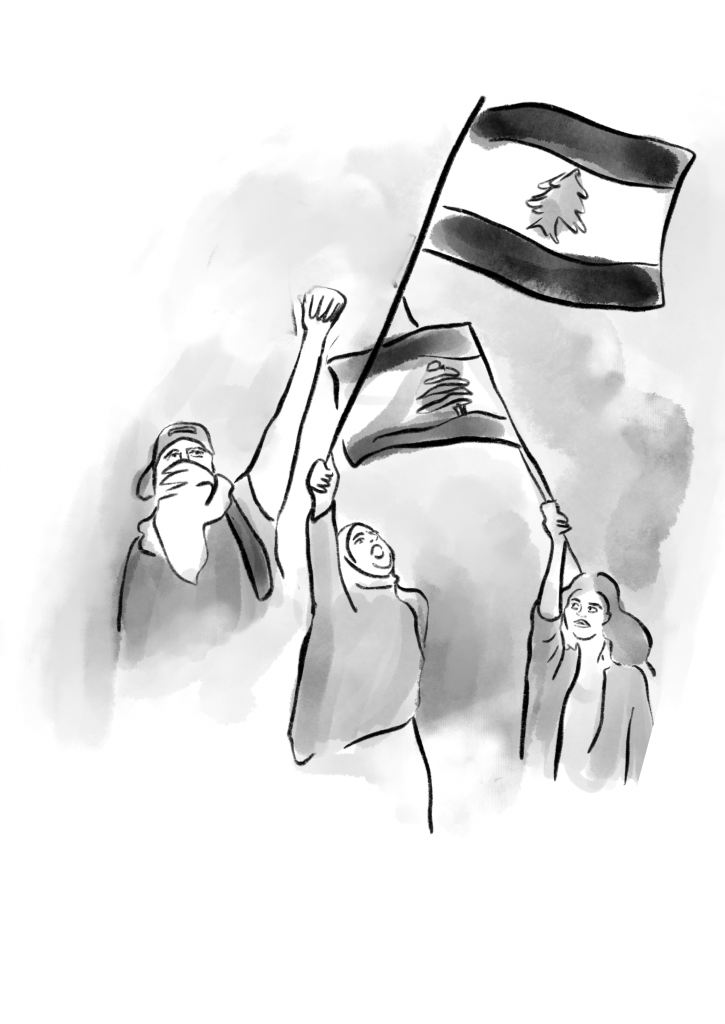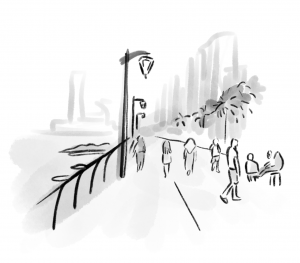
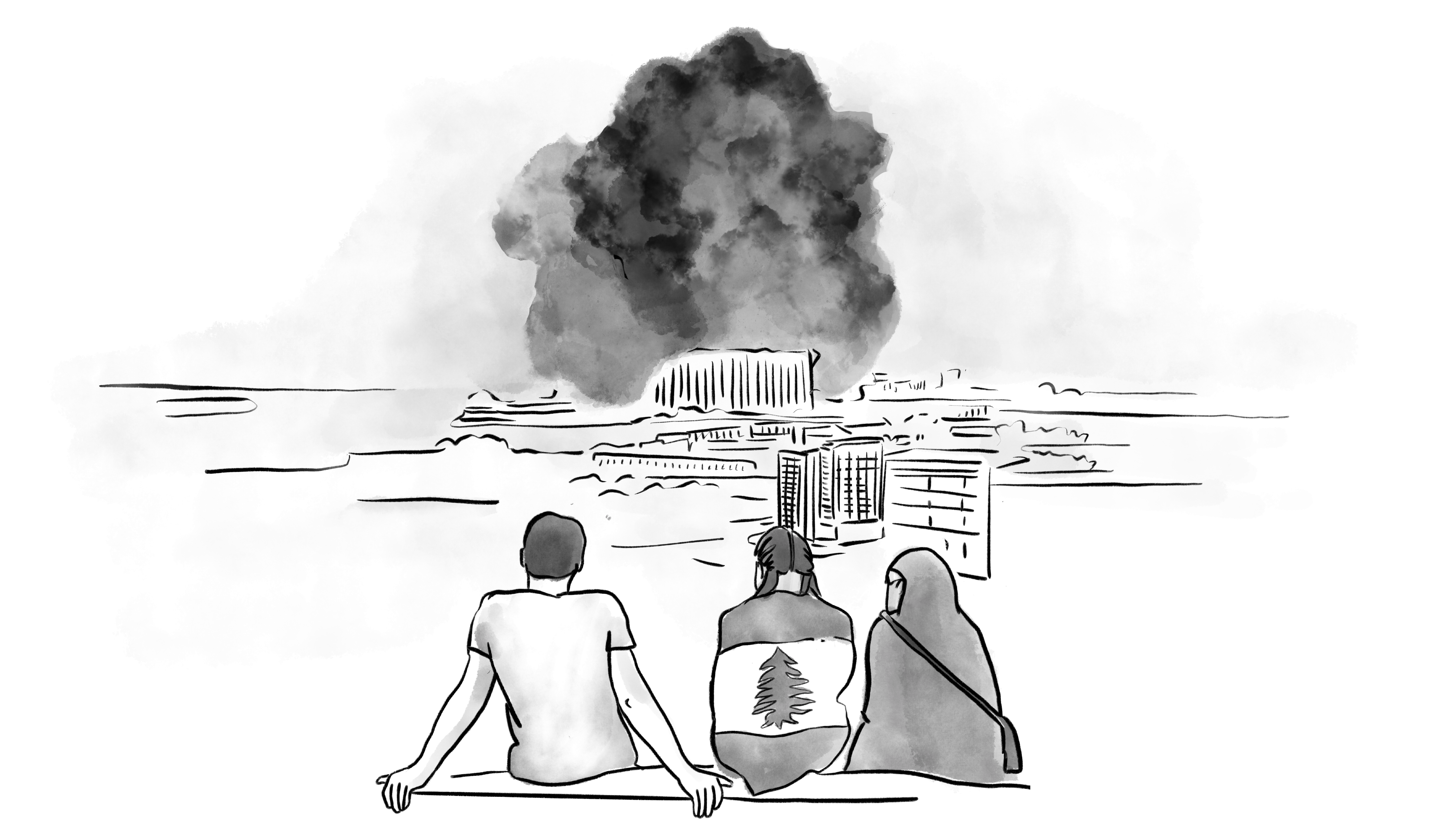


A bottle of water in my backpack, a cap on my head, and running shoes on, I set off to run some errands on this boiling August Tuesday in Beirut. Lebanon is now under a third lockdown this year. But a special lockdown: from Friday to Monday, the country is shut down, but on Tuesday and Wednesday businesses can operate normally.
On my to-do-list of this almost normal day, are all the chores I haven’t had a chance to do since I moved back from New York City two weeks ago. Getting some clothes altered by the seamstress, visiting the family, and getting a birthday gift to a friend. As I walk around the city, I daydream about how Beirut would feel like as another city. I could walk to a bus stop, or even bike around, I wouldn’t have to be stuck in traffic for an absurd amount of time to travel a ridiculously short distance. Maybe during this summer day I could sit on a park bench, enjoying the sight of all the children running around on the grass. And later in the week I would head out of Beirut, to one of our many public beaches that are rigorously cleaned by the government. Sounds normal, easy even.
A loud honk interrupts my day dream and I find myself back in a Beirut where cars park on sidewalks and pedestrians walk in the middle of the highway.
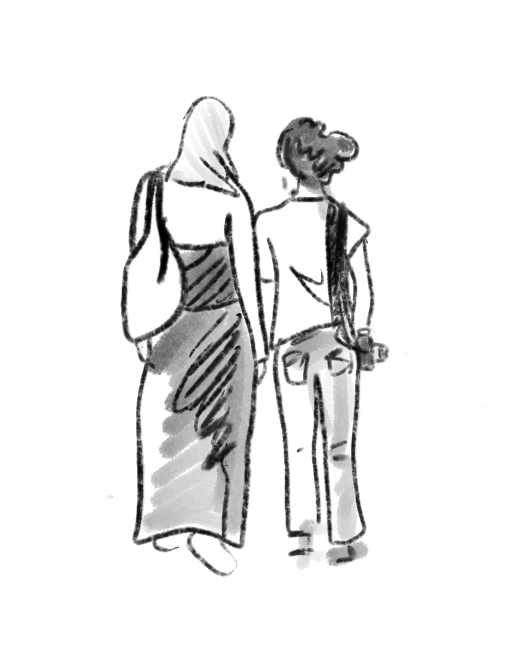
I complete my errands and arrive back home, exhausted from my morning walking. I’m supposed to meet a friend at 5:30 in Mar Mikhael, one of Beirut’s hippest neighborhoods where bars, restaurants and art galleries overlap. But at the last minute, he cancels to help out a friend. Maybe I’ll head to the gym then, before heading out to dinner.
I settle down to work at my desk. I have stories to write, and research to conduct. I think there are some peaches in the fridge so I get up and grab one. Today is the first day since I arrived back in Beirut where I’ve led somewhat of a routine. As I get up to grab something from the bookshelf I look at the peach on my desk. It starts moving.
Now my desk is shaking. Is it an earthquake? It’s the first time I’ve felt an earthquake that strong in Lebanon. I hear a loud noise. Is my building collapsing? No, it sounds like a loud explosion or something falling. I look at the window to my right and I see some black residue, huge particles of dust floating in a heavy gray cloud.
What on earth is that?
And then the blast. The sound of glass shattered mixes with my mother’s screams. Did I scream too? My ear-drum feels like it’s exploded. A blinding flash appears before my eyes. A trick from my brain maybe? For a second, not even, for a millisecond, I think this is what movies describe as seeing your life flash before your eyes.


My right wrist hurts. I know it’s because I’ve spent too much time on my phone the past week.
For the past four days Lebanon has witnessed an uprising unlike any in memory. Newly announced economic restrictions and a series of wildfires poorly managed by the government had pushed the country to the edge.Then the government tried to impose even more taxes, including on messaging services such as Whatsapp. This was too much. That night, the thawra, revolution in Arabic, was born.
I just learned that a protester died in Beirut. He is the second martyr of the thawra. I’ve spent the day on my phone. I am fuming at my government, angry that I’m so far away and cannot express my rage. I am angry that I have to go to work, take the bus, and be a civilized flat mate when all I want to do is scream at the top of my lungs that I am furious and fed up with the way this government has been treating my country for years.
I am envious of my friends who are on the streets.. I want to be there, to bang on pans, to dance in the streets I have worked so long and hard on making mine. I gave a lot of myself to adopt this city. And now that she awakens, I’m not there to celebrate it. I’m jealous of all the journalists covering the protests, the photographers immortalizing the protagonists of this movement, and the videographers recording each fire set alight, because they are lucky, they are there. But they weren’t there when we were only a dozen protesters outside the parliament a few years ago. I was.
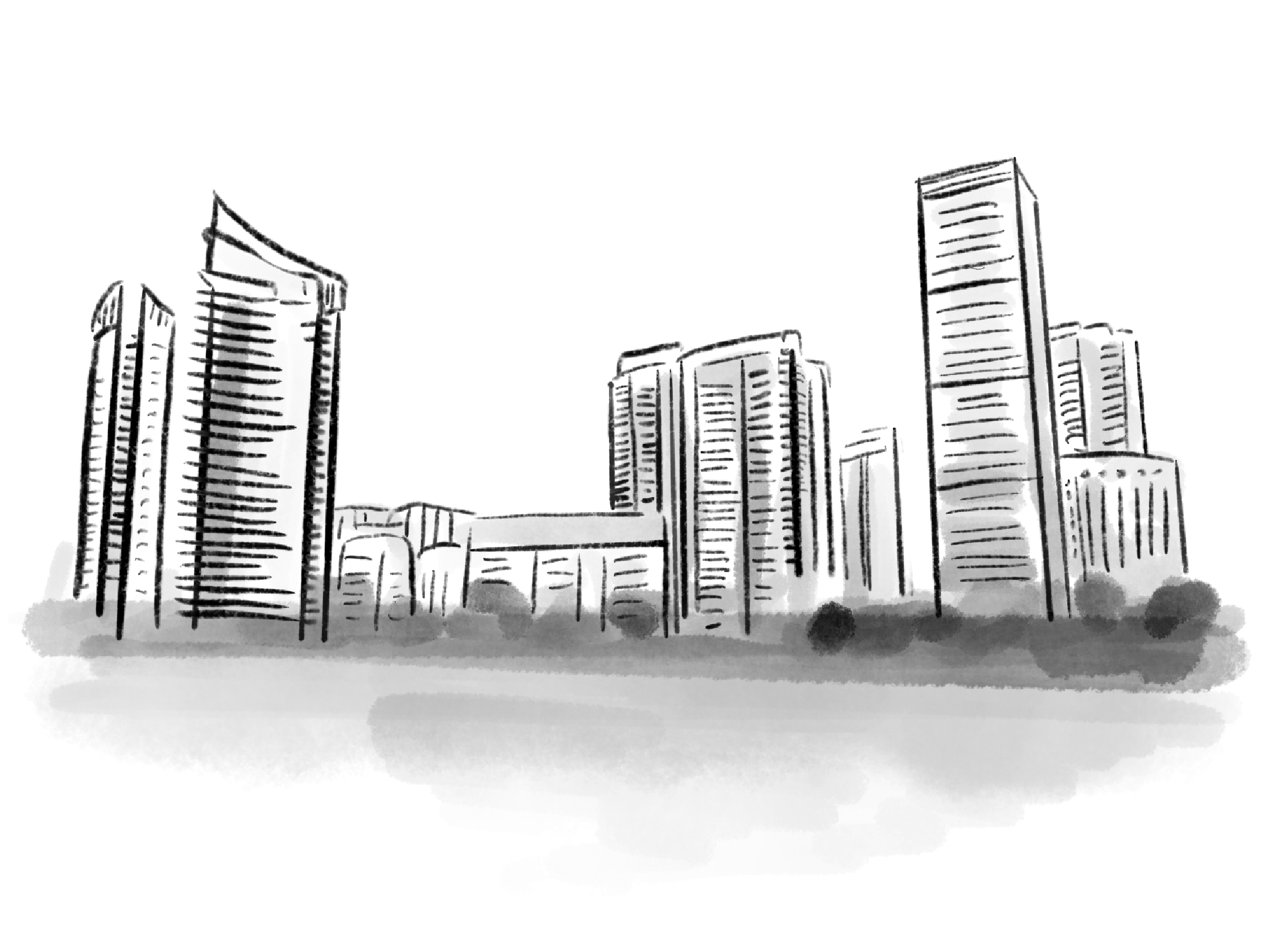

When planes approach Beirut you can usually see the whole coast through the windows on the left hand side. People look out and their excitement grows. But on my flight back to Beirut on this grim December Monday, my flight was silent as the coast appeared. Some people had their phones out. Others just looked out quietly. My heart tightened when I saw this oh so familiar sight. After months of looking at it through my screen, there it was. Lebanon. In all its splendor and misery. Birds migrate south during the cold months the same way Lebanese expatriates return to the motherland for the end of year holidays. A rite of passage for generations who have left Lebanon. But this year, the ritual was bittersweet. As of December, Lebanon is now the third most indebted country in the world, nearly a quarter of its population lives below the poverty line, and its national currency has so far lost twenty-five percent of its value.
It was not a warm welcome home. Nonetheless, my mother was at the arrivals gate to welcome me with arms wide open. On the ride home, I tried to catch glimpses, remnants of the protests, or some sign of revolution going on somewhere. It would have to wait.
On this winter day, Beirut seemed normal.
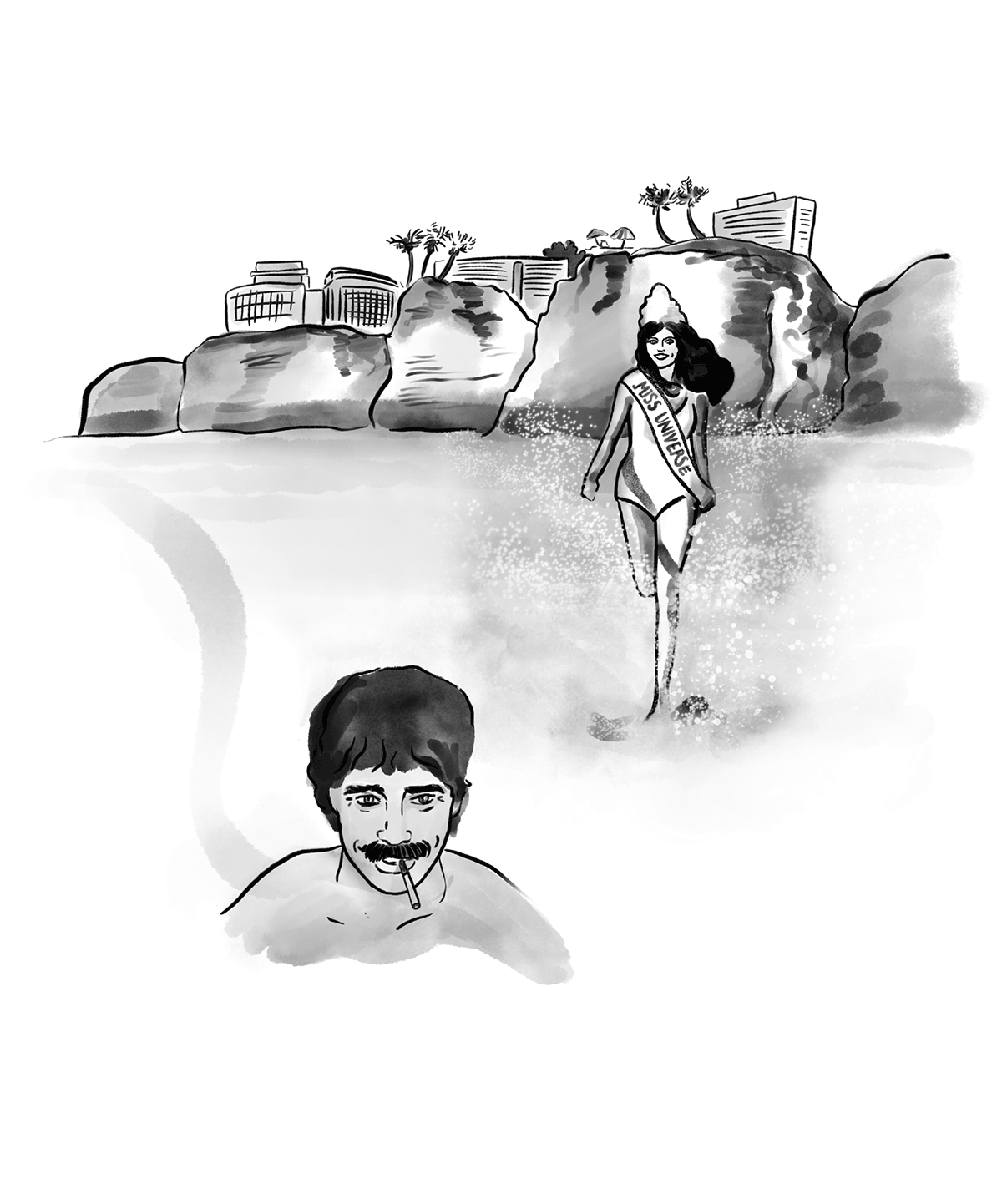


My mother asked me to go with her to the serraf, the money changer. The Lebanese Pound was fixed at 1500 to the US dollar in 1997, when both currencies became interchangeable. That was, until 2019. For the past few years, economists have warned of a collapse of the Lebanese Pound; the thawra was a result of this collapse and precipitated the inflation.
Banks applied draconian measures on its clients in the absence of an official response to stabilize the Pound. They limited and restricted the transfers outside the country, and imposed limits on clients’ weekly dollar withdrawals. Once the dollars were safely out of the accounts, many would exchange them for Lebanese Pounds.
We entered the money changer’s small cubicle whose blue walls and flickering fluorescent lights triggered my anxiety. The serraf’’s phone rang: “Today, it’s 2,050 Lebanese lira. What will it be tomorrow I don’t know,” he replied, sighting. With a nod of the head, he called my mom and me up to the counter. Buried under wads of money, he pulled out a calculator, a pen, and finally a notebook, angrily flipping through its pages to note down his transactions of the day. Needless to say, he was on edge.
In the tiny elevator on the way out, my mom confessed, “It breaks my heart to do this.”
My mom was in her early twenties when the civil war began.. Her generation had seen the exchange rate fluctuate, and finally stabilize. Did they think they had reached a point of stability? Did they ever expect that thirty years after what was believed to be the end of the civil war they would be miserable again? With a growing number of Lebanese citizens living in poverty basic necessities such as food and diapers became inaccessible.
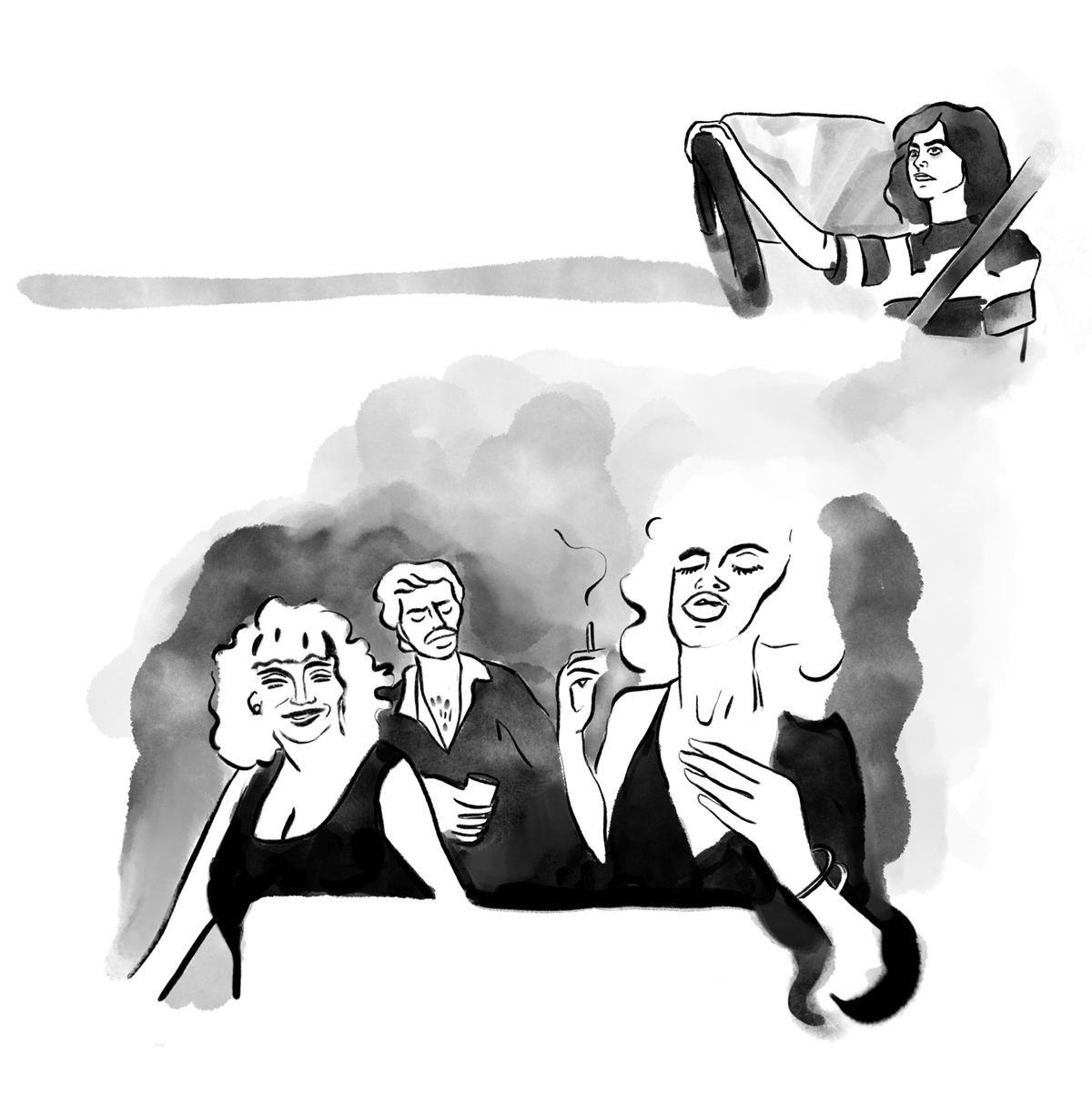
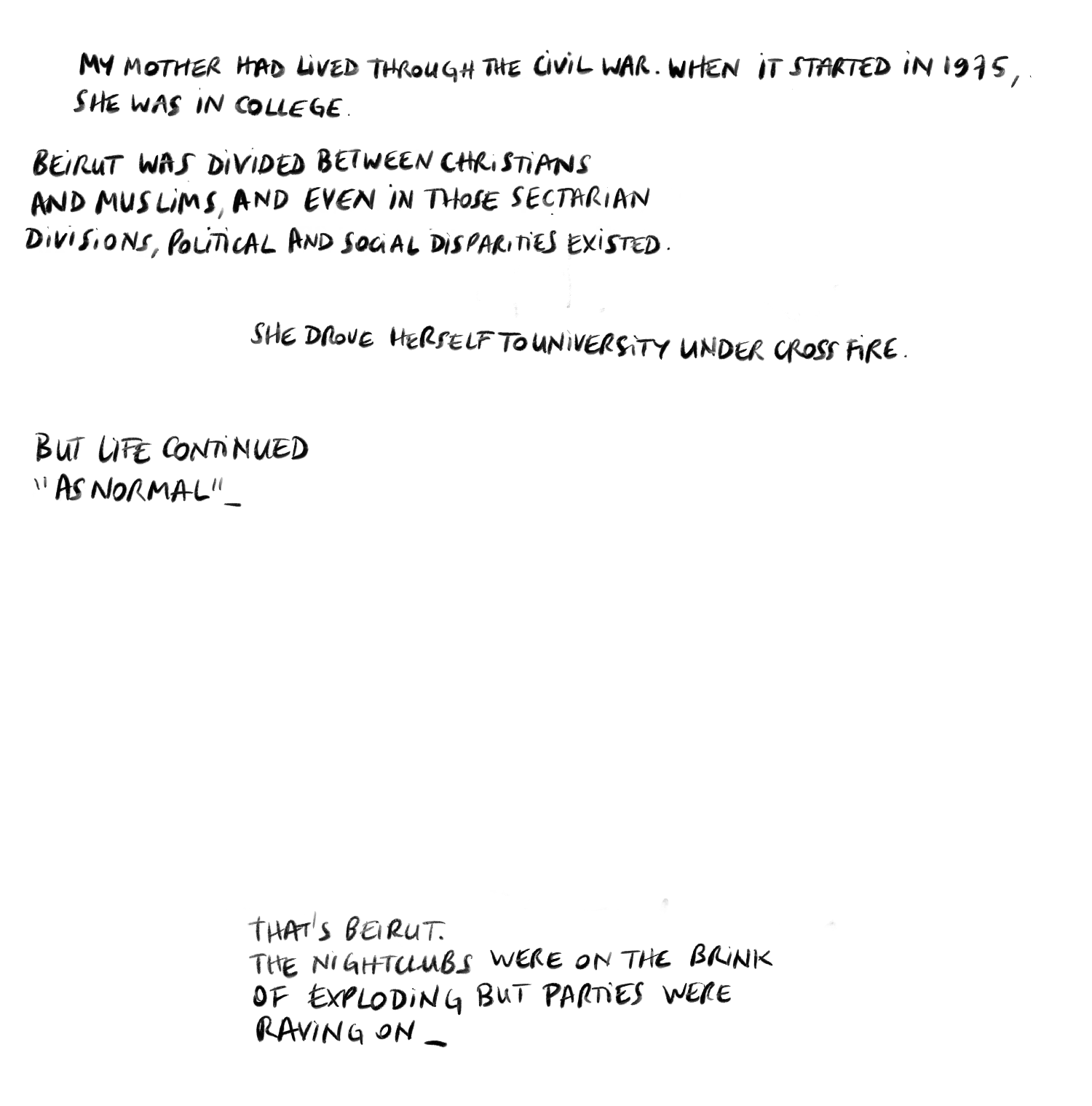
At 6 PM that same day, the president, Michel Aoun, appointed a new prime minister, Hassan Diab, and charged him with forming a new government. Some believed that by appointing a new prime minister the president was trying to calm down and clear away protesters. But the people remained furious. By this point, they had been on the streets for two months.
I was supposed to head over to the airport with my mother to pick up my brother, who was also coming back for the winter holidays. “Go ahead,” I told her. “I’m going to the protests.” I didn’t know what to expect. I was excited, of course, I had been waiting to get to the streets since that first night of October 17 when I would watch videos of the protests on loop.
A small gathering of around a hundred people met in downtown Beirut, where the protests usually took place, nothing compared to the millions of two months ago, but my first protest nonetheless.
Fatigue was starting to show, as fewer people were on the streets, and you could feel the fragmentation amongst the protesters. Some wanted to give Hassan Diab a chance, while others were not prepared to compromise on their demands: They first wanted the dissolution of the corrupt government and the formation of a new technocratic one. Five people blocked the street in front of the entrance to the parliament building. A few minutes later, another group joined them. Some chanted, others beat on pans, and a few held hastily written banners.
Months of anticipation, of reading and scrolling and wanting so much to be back and on the streets with everyone. But change takes time, and does not happen linearly. So it was that when I finally joined the thawra, everybody else was exhausted.

A Saturday night at home in Beirut and one of my brother’s friends was talking about the company he works for, and how they let go many employees. Another friend jumped in to say that salaries were cut at his company to make sure no one got laid off..
Lebanon had almost reached rock bottom, we thought. But something new has emerged: a movement. We now felt responsible for each other. Whoever could lend a hand, spare time volunteering, or provide a meal to those in need, would bend over backwards to help out. A warm but scary feeling.
Lebanon has always been known for its hospitality, its people’s warmth. Foreigners would leave the country talking about how they were offered food and coffee each time they walked into someone’s house, which is undeniably true. But never had Lebanese been so keen on being out on the streets. Not only to fight and protest, but also to help in a makeshift kitchen open and free to all, to receive and distribute donations across the country, and to clean the streets at dawn from the trash protesters left behind at night.
If I were to oversimplify it, the revolution was against the government, the banks, and the corrupt elite. Lebanese needed to hate the same enemy to come together and forget their differences. NGOs and grassroot civil movements flourished from this movement. The regime hasn’t been overthrown yet; poverty and hunger are far from being eradicated. But a spark was ignited, a small fire had been lit.
The fire I had been waiting for so long has finally started. But it had not waited for me.
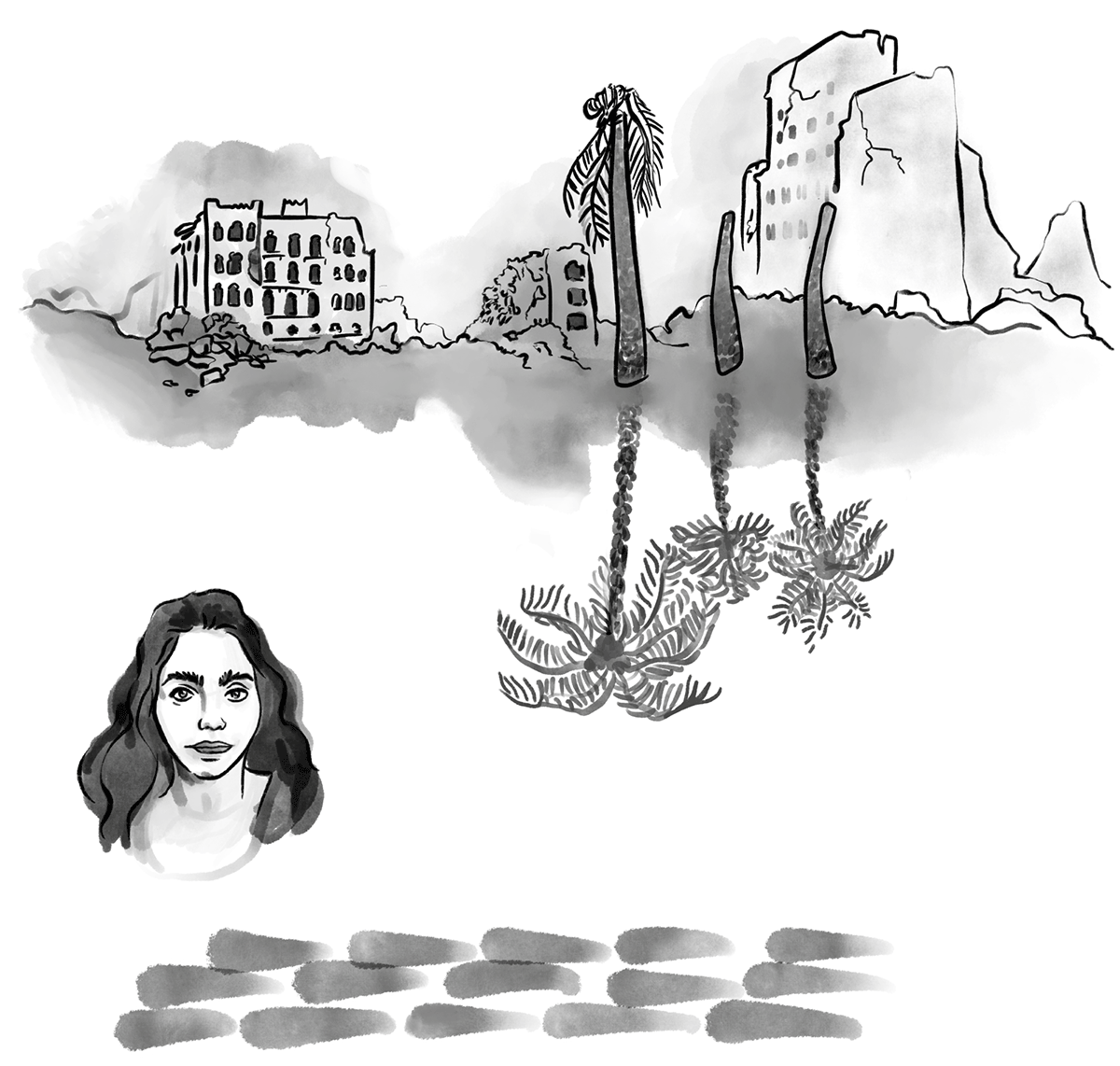


Today was my first time at a real protest. Or so I thought.
As I started exploring the main square where the protesters gathered, I saw the various landmarks that I had seen over the past few months through my social media feeds: the man selling corn from his cart; the wooden fist that was burned down and rebuilt as a sign of resilience; the people banging on metal fences. It almost looked like a tourist attraction.
I felt confused, numb. I was walking aimlessly, with my huge camera flash, like an elephant in a porcelain shop, uncomfortable, trying to find my place in this play where all the roles had already been assigned.
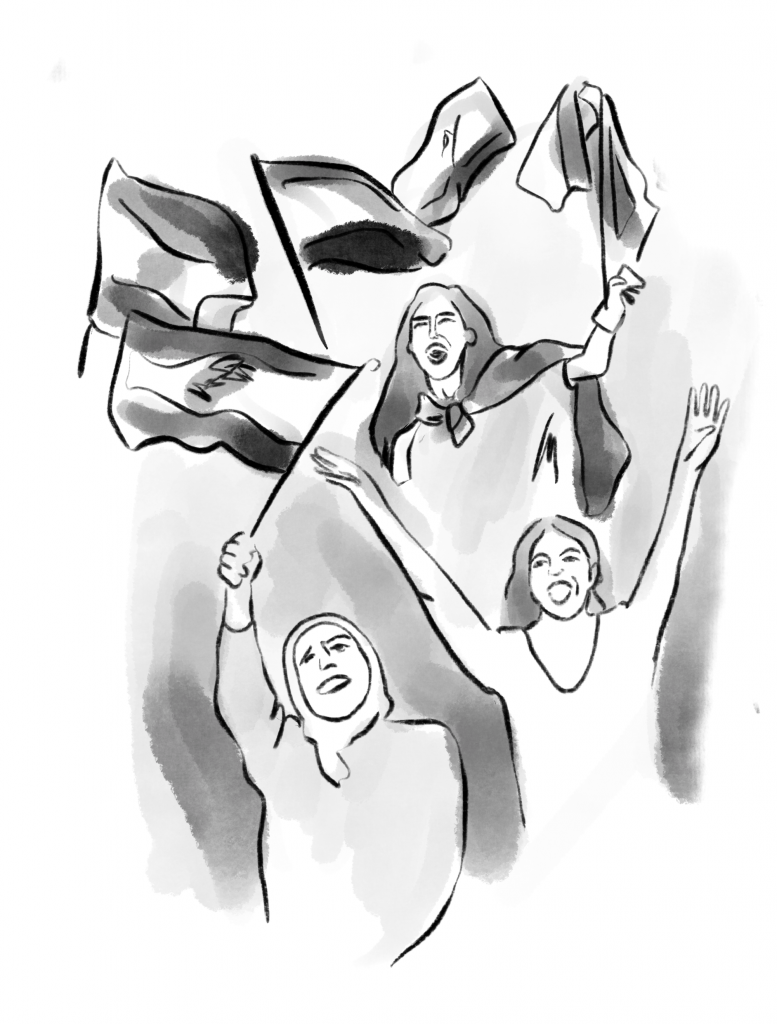
For years I had waited, waited, and waited to see Beirut like this. When everyone else was leaving, I stayed and fought in the hopes of seeing this country stand up for itself. Eventually, I thought I would give the rest of the world a chance. Eventually, I left, too.
But the guilt of leaving followed me to the streets of New York, to my various apartments across Brooklyn, to the houses I called home. Lebanon crawled back to me, through my phone, the news, my dreams and nightmares. I felt that I failed in my mission of making this country better. Then came the thawra and I was left to watch from a great distance all those people and flags, those candles and burning tires, the teargas and tears.
Yet now here I was, back in Lebanon. Or what remained of it. I was finally standing here, where my heart had been for months. But my heart did not feel at home.
The thawra had not waited for me, as I hoped it would. The thawra had a life of its own, a life to which I would have to learn to adapt.

Walking around downtown where the demonstrations took place, I noticed that protesters camping out in tents were worried. A storm was supposed to hit Lebanon that night, and some tents had already been destroyed by the wind.
As I walked towards the tents, I saw a man sunbathing on an office chair outside his tent.
“Can I take a picture of you?” I asked.
“Sure,” he said, “go ahead.”
Next thing I knew I was sitting on the fake grass next to him, asking about his opinion on the thawra and what not.
“I don’t have any hope left in it,” said Mohammad, who was 29. “The people are tired. They’re not standing together anymore.”
A little boy emerged from the tent behind him, holding a yellow coffee cup. “I still have hope in the thawra!” said the boy whose name was Hammoudi. He and his family were from Akkar, the Northern-most region of Lebanon. Hammoudi used to go to school before the start of the thawra, but since it began he has been camping downtown with his family. Two little girls with matching pink long sleeve shirts and long copper hair arrived, screaming and squealing. They were Hammoudi’s younger sisters, Suzi and Salma. Suzi, the eldest sister, roller bladed her way toward us, while Salma hurried behind with a bag of chips in her hands.
Salma started feeding me chips. “Take some,” she insisted. “They’re really good!” Here I was on a windy Christmas day, sharing chips with this eight year old girl who had been sleeping in a tent for months.
Akkar is about three hours from Beirut, and shares a border with Syria. Along with Tripoli, the capital of the North Governorate — which was also dubbed the bride of the thawra for its peoples’ fury and involvement in the protests — Akkar has been particularly affected by the economic crisis, with sixty percent of its population living in poverty.
“I have faith in the thawra too,” Salma explained. “I’m going to stand for my country, alongside my brothers and sisters.”
Mohammad, Hammoudi, Salma, Sussi and I walked around downtown. Mohammad gave me a tour of the area. “Over here are the tents from this region of Lebanon, and over there, the hotspot of the protests, where everything happened the first two weeks.”
Beirut has always been a city of contradiction, but since the start of the thawra, they grew wider. Tonight, I dressed up in a nice sparkly suit for Christmas Eve dinner with my family. This was the first year my uncle didn’t put up a Christmas tree. Fairy lights and copper Christmas balls didn’t fit the mood. The dinner went smoothly, until the topic of politics and banks came up. Everyone shared their opinion — rather loudly — over turkey, wine, and a yule log.
A Christmas like no other.
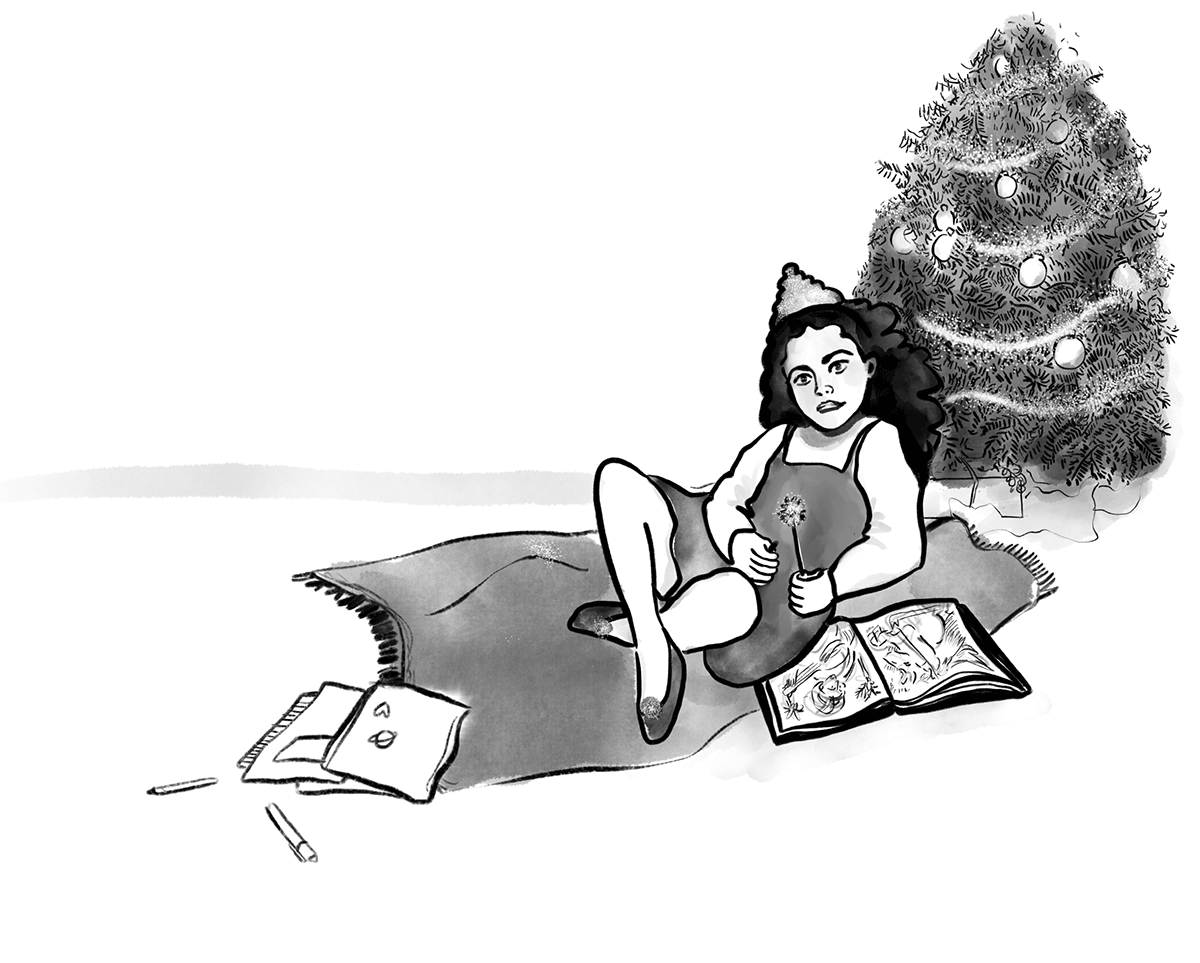


I joined a protest in front of the Lebanese Central Bank. A rather thin one. Two months ago, hundreds of protesters gathered calling for an investigation of politicians’ bank accounts. Today around fifty people were there.
Before October, the only other other protest comparable was in 2005, after the assasination of then-prime minister Rafik Hariri, when people revolted against the heavy political Syrian presence. For fifteen years some rallies had taken place, but nothing on this scale. I attended a few, hoping they would grow into something bigger, into the thawra. But they all eventually died out.
This time, it was different. In October, some came by foot, others by bus. Some camped and spent the night. Public spaces that were once haunted and deserted now hosted shows and talks. The protests started peacefully, with smiles that accompanied the anger and with chants of rage. Sure, there were burning tires, shattered storefronts, and blasphemies graffitied up on the walls, but aren’t these part of a revolution? Eventually, the government pulled out teargas and water cannons. Protesters answered with rocks.
Today, a flag or two were raised, and some slogans chanted, but the crowd eventually dispersed.

Nightlife has always been important for Beirut. We may not have electricity 24 hours a day, running water, and garbage is scattered on the streets. But we have some of the best clubs in the world.
I went out to three different clubs, all of them packed. Hours stuck in the queues, and the clubs, although full, still welcomed people in. No one could move, let alone dance together. The intoxicating smell of cigarettes, the drinks spilled on the beautiful sequin dresses some girls twirled in, and the loud beat of the bass made this chaotic time in Lebanon feel almost normal. Another weekend in Beirut, the nightlife capital of the Middle East.
Clubbing became a therapy for Lebanon toward the end of the civil war. Today Lebanese went clubbing to escape reality, forget about the banks, and live something of a normal life. But what is normal in this country anymore? Has anything ever been normal?
Economic and sectarian segregation grew wider while the nightlife flourished. The youth kept leaving the country as opportunities grew scarcer, but more night clubs kept mushrooming across the city. International artists would praise Beirut for its diversity and historical richness, while its own population felt uncomfortable with its own history. Was there ever a norm in Lebanon? Or have we grown used to our lack of constant? Will we — or can we — have the strength to build a new constant?
Maybe Lebanon is more dynamic in the clubs than on the streets.

While some of my friends chose to spend New Year’s Eve in the mountains, I decided to spend it in the city alongside other protesters who celebrated. “All the expats want to go to the streets because you guys just got here,” said a friend who had joined the protests at the outset. “But we have been here for three months fighting, and tonight is the only break we get.”
At 11:50, I was downtown with some friends ready to celebrate the New Year. I had never seen downtown so full of people, life, and lights. There were street performers, food and alcohol stands, and people dancing and laughing all around the square. It was the first time I had seen the square so lively. People demand public spaces. Parks. Places to go on Sunday and spend some family time, without paying an entrance fee.
Less than thirteen percent of Beirut’s urban spaces are open to the public. Where do people spend the nine months when the sun shines bright? Out of 220 kilometers of Mediteranean seaside, only twenty percent remains accessible to the public; the remaining eighty percent are privately owned or inaccessible by foot.
On this 31st of December 2019, I spent my first New Year’s Eve in a public space in Lebanon. Golden confetti was fired at midnight and music blasted. It felt refreshing to be out on the streets that night, natural, the way cities should be. There was nowhere else I wanted to be.
Nowhere in the world, besides Beirut.
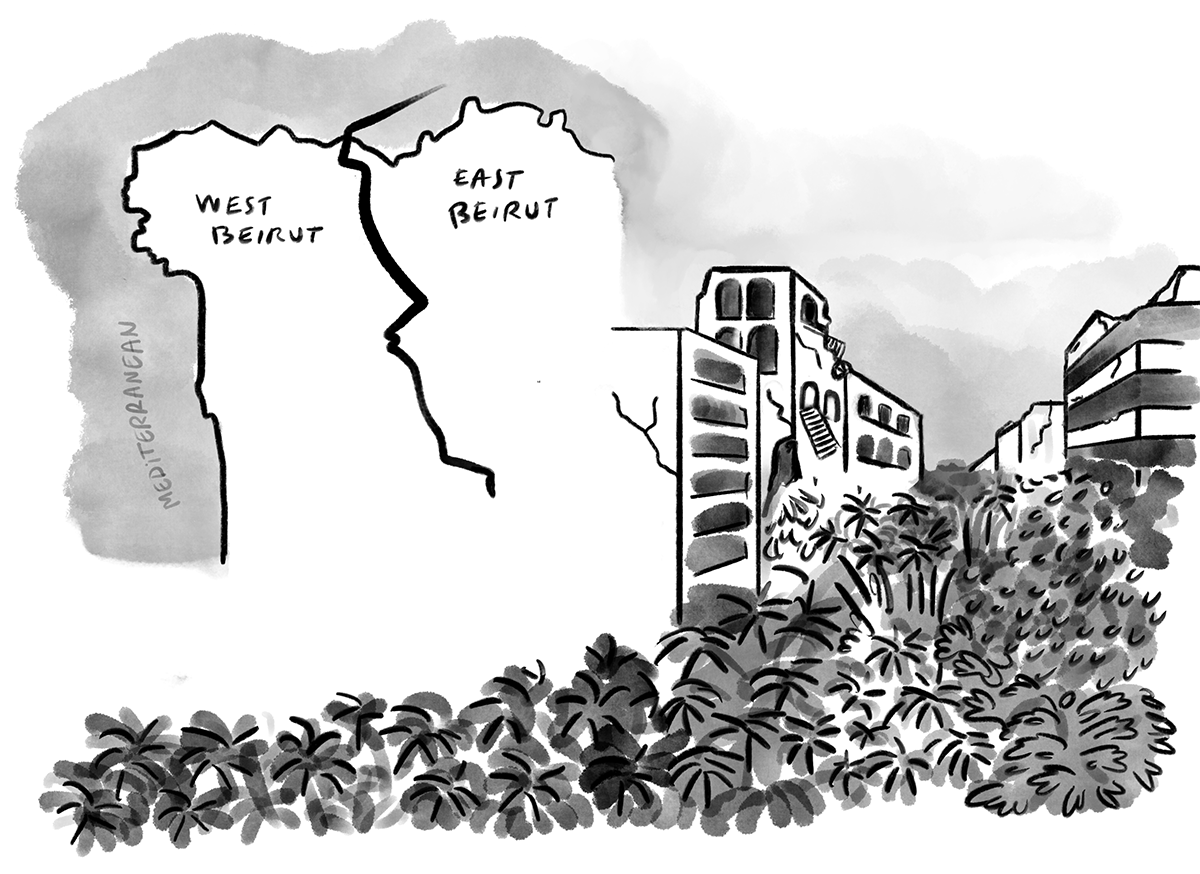

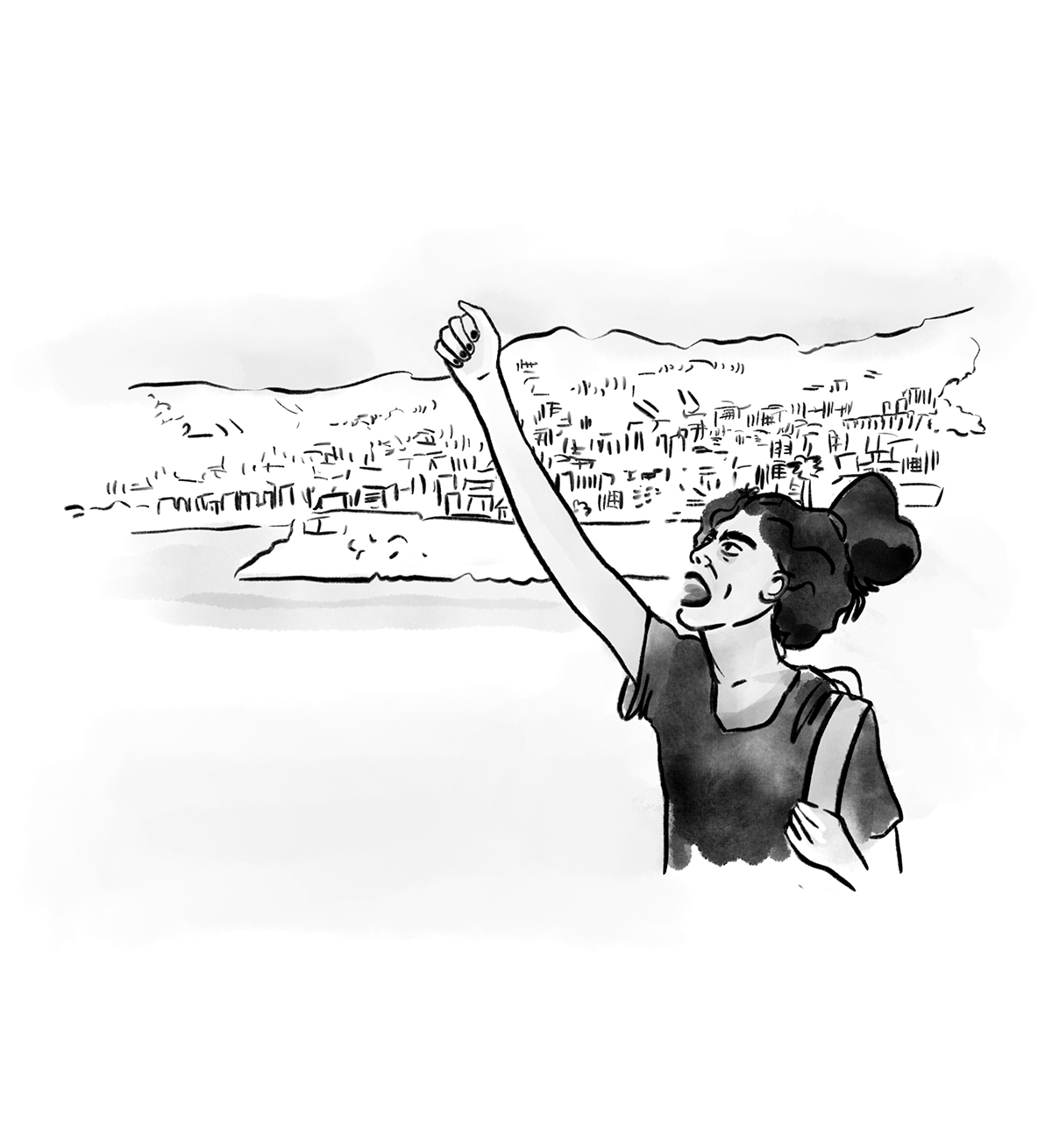
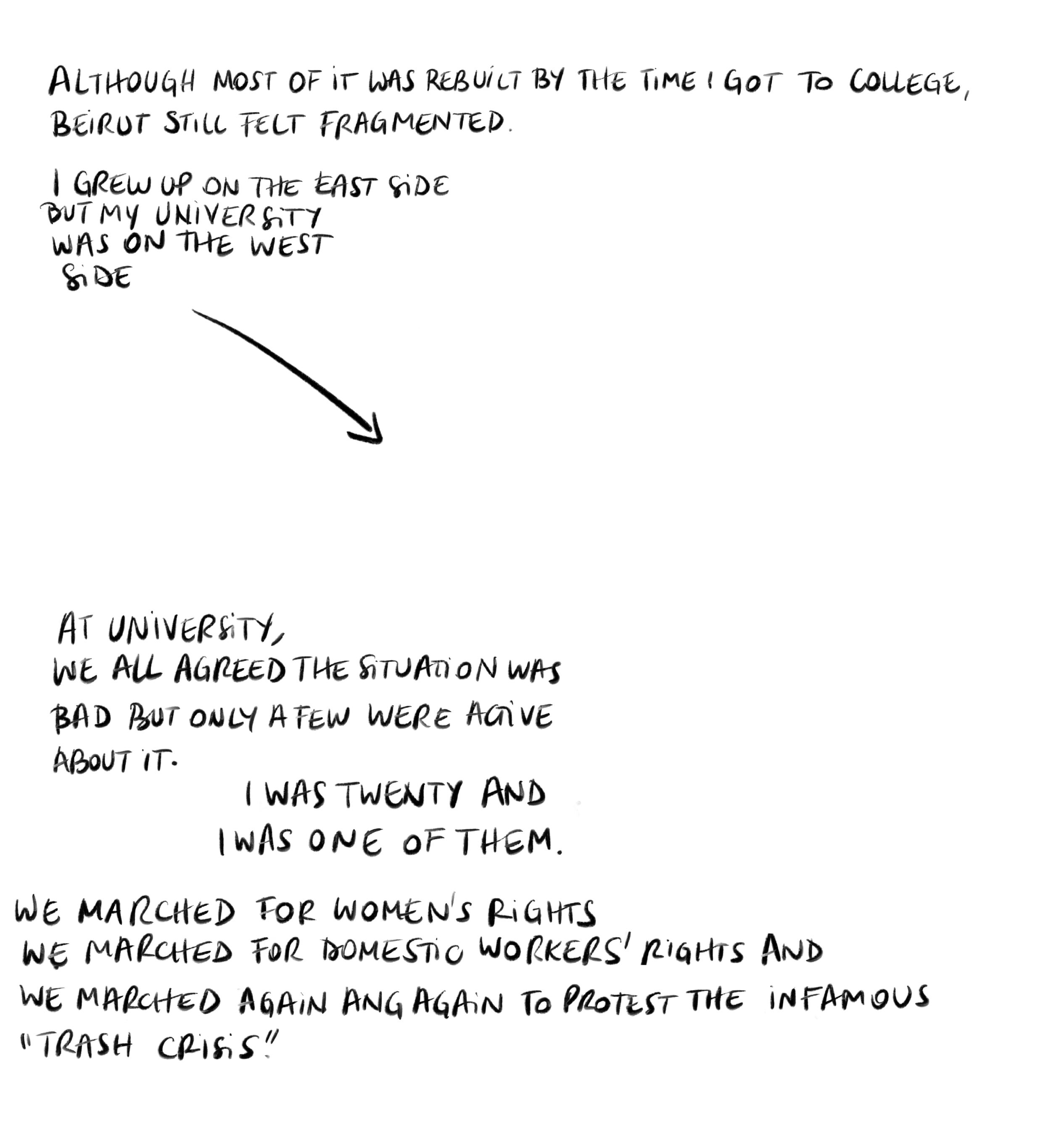

My first reflex when I wake up is to check my phone. All throughout October, November, and December, I would wake up to messages from my friends updating me about the latest development of the protests. This morning, I woke up to a BBC notification that caught my eye. “US kills top Iranian general in Baghdad through an airstrike.”
That night I went out for drinks with friends. Beirut was full. Bars were full, with traffic everywhere, clubs loudly blasting music. I don’t understand this city. WWIII is trending on Twitter, but bars have a 45-minute wait. This isn’t new for Beirut. Many say that Lebanese party hard because they have lost so much, and know they might lose more at any moment; might as well make the most of what they have now.
Qasem Soleimani, a major general in Iran’s Revolutionary Guard, was killed in a US-led airstrike. Beyond diplomatic ties, Iran exercises a heavy political influence in Lebanon. Where sect and politics intertwine, a major event in Iran can have direct consequences on Lebanon. What would Soleimani’s death mean to Lebanon, since the country was already hanging by a thread?
During the past few days, another event dominated Lebanon’s headlines. Carlos Ghosn, Nissan’s former CEO accused of financial wrongdoing in Japan, theatrically fled the country in what is said to be a cello case. On December 31, he turned up in Beirut, followed by a hoard of Japanese journalists camping day and night outside his home.
At this point, the thawra became a backdrop for international actors to put on their shows.

The past week brought a reality check for Lebanon: back to normal, but then again what was normal anymore? Would people rush back to the streets protesting now that the holidays were over? Would the exchange rate ever go back to what it was? My family would speak of this crisis as unprecedented in Lebanon’s history. They lived through the war, but the economic crisis, the plummeting prices of basic necessities, and skyrocketing unemployment rate reached a new level.
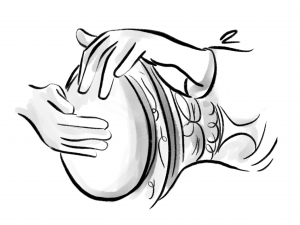
Somehow, some parts of Lebanon endured. My brother, mother, and I went to dinner in one of Beirut’s hippest restaurants. “Who in their right mind would go out to a restaurant nowadays,” my mother sarcastically said as we hopped in the car. But the restaurant was full. Tables of families and friends lavishly dressed in fur, sparkling from head to toe, shaking their hips to the musician’s derbake, a traditional type of drum, drank and ate, until late into the night. On the eve of my brother’s departure, we walked by the waterfront, where people jogged, biked, and even swam in the sea. Tomorrow he will leave again, as he has for the previous eight years, like the thousands of other expatriates returning to their studies, jobs, or families abroad.
Goodbyes always hurt. They sting and poke that little corner of the heart. But goodbyes had an even greater bittersweet aftertaste this year. What are we leaving behind, and what will we come back to, we the expats, who migrate back to Lebanon twice a year, but leave the country in the fangs of its corrupt leaders for the rest of the year?

Protests erupted again this past weekend. Blockades and tents took over crossroads and highways while banks doubled their security by adding metal gates to their windows. Protesters are angry. Flowers, candles, and chants will not be enough anymore.
“The Week of Anger” starts tomorrow. After a two week lull, the thawra is slowly showing the tip of its nose. Since October, no clear leader orchestrated the protests, but similar to a well-rehearsed symphony orchestra, all the musicians knew their parts. People from Tripoli knew what roads to block, protesters from Beirut burned tires and trash cans again, while Nabbatiyeh, a city in the south, dared to revolt despite a heavy political presence. Protesters are giving the prime minister and caretaker ministers two days to form a new government.
Lebanon is not on the verge of collapse. It’s collapsing as I’m standing on it. It already collapsed, but we’re hanging on to bits and pieces of it. Lebanon collapsed, and I feel powerless.
Hundreds of people are losing their jobs by the day, with the unemployment rate for Lebanese under thirty-five nearing forty percent. Some malls, restaurants, and small businesses shut down their storefronts forever with 25,000 of the 150,000 employees in the food and beverage industry left jobless in September 2019 . Medications are hard to come across for some hospitals, pharmacies also limiting the amount of medicine per customer. Essential items either disappeared from the shelves or saw their prices skyrocket.
I’m standing on the edge of history. I’m terrified to take a leap forward. Lebanon has nothing to lose anymore; it has already lost too much. Lebanese want to change the country, its doomed fate, in the hope of a better tomorrow. Little did they know, by wanting to write the future, they were writing history. By fighting for a better tomorrow, they are creating today’s Lebanon, hoping yesterday will end in the history books we will one day write.
But at this point,my friends and family are emotionally drained. They’re exhausted. Living is now surviving.. The thawra might be slowly picking up. Now that the expats have left, and the holidays are over, it’s time to get back to work. The real work.
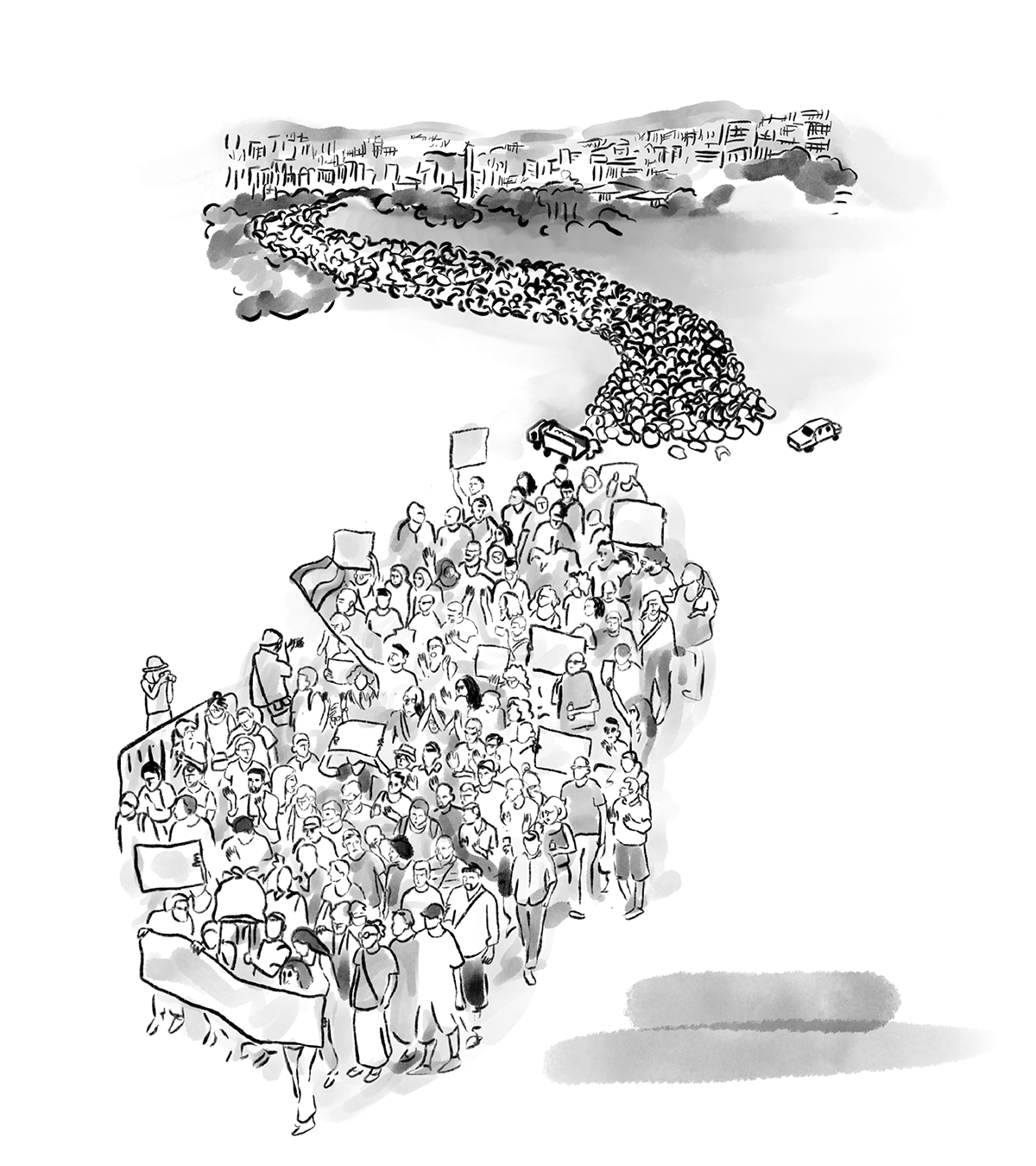


I woke up with adrenaline surging through my body. It was the beginning of a new story for me, but merely another chapter of the thawra. I spent the morning working from home, then headed over to the “Ring,” one of the main thoroughfares in Beirut but also the bridge connecting old East and West Beirut.
When I got there at around 3 PM, people were already burning tires. Some had even been on the streets since 6 in the morning. Black smoke rose from the fires, darkening the sky, letting only a few sunrays pierce through the thick smoke. It all looked so surreal.
The people gathered at the “Ring,” chanted, drummed, and marched towards the newly appointed prime minister’s house, to pressure him to form a government.
My mother later joined me at the protest. What a funny sight to see my mom, this petite woman, standing next to Lebanese flags twice her size and trash bins about to go up in flames. I felt proud, amused, and sad. As I looked around, most of the protesters were quite young. Lebanon’s youth suffers the most from the lack of opportunities in the country. Many consider Lebanon a “dead-end.” But we can still fight, we still have the breath to do it.
My mother, her generation, those who went through the war, they’ve had enough. They saw a part of their lives taken away from them. From those who survived the war, some took advantage of the city’s deplorable state to stuff their own pockets, while others turned a blind eye, simply hoping for a better future. When the post civil war generation tried to rebuild Lebanon, they took whatever and whoever was good enough to build something of a normal life, even if it meant corruption was part of the equation. Are they to blame for Lebanon’s crumbling state? Partly. But now is not the moment to talk about regrets and what should, could, would have been done. Now is the time to reclaim the country’s dignity.
After my mother left the protests, I met up with my friends who had been on the streets since October. They introduced me to Ali. I had seen him at some previous protests, but I of course recognized him from all the pictures I saw on social media. With his white megaphone, a black and white keffiyeh wrapped around his neck, and his black backpack, Ali led the chants, thousands of protesters repeating the slogans he screamed. Wherever there’s Ali, Sam is not far. I knew Sam through mutual friends. If it wasn’t for the dark circles beneath his eyes that betrayed his fatigue, he would have been the same Sam I knew from bars and parties. But he also had a mask and a helmet to protect him from rubber bullets, a flag stuck to his backpack, and of course his signature tennis racket to serve back the teargas fired by the security forces. Myriam was also there. She has photographed the protests since their early days with her distinguished style, blinding flash, and electric colors.
The thawra stank of smoke, and tasted of the candies we bought at the nearby grocery story to sweeten those sour times. It was loud: a combination of drums, bangs, and screams. The thawra felt crowded. The thawra looked beautiful.
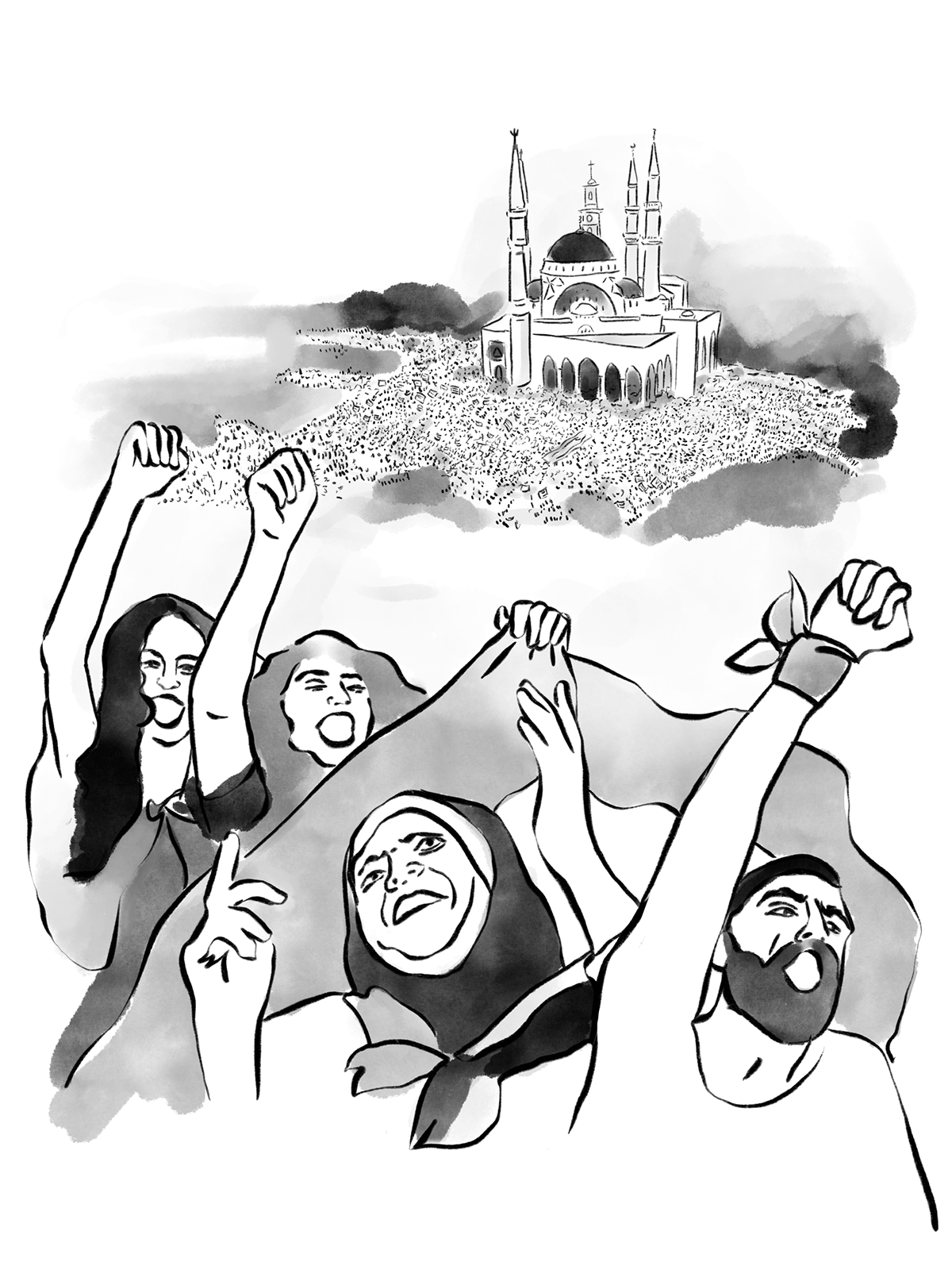


The eve of my departure. It was all planned out: family time, protest time, and friends time before a short night of sleep and a day of flights and layovers to head back to New York. But things didn’t exactly go as planned.
Family time, then protest time. And the protests escalated. We started with flags, chants, and banners. Children, adults, and older people gathered in Sassine, a square in one of Beirut’s residential neighborhoods. We were set to meet other marchers downtown and all head over together to the parliament. The atmosphere was joyful, people were smiling, dancing, and laughing. When we reached the “Hotel Dieu,” one of Beirut’s main hospitals, we stopped to clap and cheer for the medical workers who had gone to great lengths to continue providing services for those in need. People were looking at the protesters from their balconies, filming them and clapping. Kids peeked curiously from afar, and some even joined the march for a few minutes, before going back to their friends who stayed behind, too shy to come forward.
We got close to downtown, where all the tents proudly stood. A friend of mine who was walking with another protest joined us. “Shit’s going down in front of the parliament,” he said. “This march looks like it’s in another world.” We soon decided to leave this group and head over to parliament and check out the situation for ourselves. Peaceful chants and marches, grew into screams and tears.
The Internal Security Forces pulled out the teargas and water cannons. Peaceful was not enough anymore, peaceful was over. Protesters threw water bottles, rocks, tree branches. Whatever they could get their hands on became a shield or a weapon. This was the first time I witnessed a protest like those I had blankly stared at on my phone in the fall. I was not prepared.
While others had safety masks and helmets I barely had a scarf covering my face to keep me from breathing the tear gas. I kept getting closer to the parliament entrance, snapping some pictures. Too absorbed by what was happening, I didn’t realize the water jet was getting closer to me. I instantly turned my back to it, but did not move, until an arm grabbed me from behind and pulled me back to the crowd.
Night had already fallen, and I still had to pack my suitcase ahead of the short night and long flight that awaited me. That day, more than 300 protesters were injured. This was the most brutal crackdown since the beginning of the protests on October 17. The confrontations went on until late into the night.
As the thawra came back to life, I was leaving. Again.

A pandemic got in the way. But the protesters are back on the streets. People are hungry. Today the Lebanese Pound is at 4,000 to the dollar. Nearly three times the still official, 20-year old rate of 1,500. Today, the thawra counts another martyr, Fouaz Foud Al-Seman, struck by gunfire from the Lebanese Army. Lebanon’s future and present, are uncertain. The rest of the world is talking about a “tomorrow,” a “going back to normal.” The world is not going back to normal. Normal failed us, and we failed to be normal.
Lebanon has tried normal, our parents have tried normal, my family gave me everything for normal. But normal is not working.
What will replace normal? A growing malaise, an uneasy discomfort, and an endless fight. Living without a constant, until we create one.


I am back in Beirut. The temperature’s reaching 36 degrees Celsius — 97 Fahrenheit. I can practically see the humidity. Trash has started piling up again; it’s now a summer tradition to see garbage invading the sidewalks. We had a forty-minute fear of another Lebanese-Israeli war, after an Israeli shell hit a house in the south. Coronavirus cases are on the rise in Lebanon. We’re entering a semi-lockdown, where institutions are closed Thursday to Monday, and some businesses will open Tuesdays and Wednesdays for the next two weeks. Apparently the virus does not spread as fast on Tuesday, and Wednesday? Today the Lebanese Pound is trading at 7,500 to the dollar on the black market, and has lost eighty percent of its value.
I was walking on the famous Corniche yesterday, on Beirut’s seaside, and there’s an amusement park right next to it. The Ferris wheel would light up the Corniche in green, red, and blue. I would see it when driving, or partying in the nightclub next to the amusement park. But yesterday, the Ferris wheel didn’t sparkle; there’s no more electricity left to power it. There’s no electricity left to power street lamps, and green lights. After the sun sets, Beirut plunges into total darkness.
When I came back from the US two weeks ago, I knew it was going to be a shock, and I would have to adapt to a different Lebanon. A part of me chose to come back to Lebanon, as I’m fearing this might be “it” for my country. This might be the end. It collapsed. And it can and will get worse. I came here because I want to try to save it, and say goodbye to it, in case I lose it forever. What a dreadful thought, to lose your country, your home, your life. We already lost all our money. A pandemic and an economic crisis precipitated even more Lebanon’s collapse. Now that we’re entering a second lockdown, what is left for Lebanon? What’s left to hang on to?
There never was a normal in Lebanon, our lives were always dependent on so many exterior factors. We all knew our routines could vanish from one minute to the next. But we danced it away, we partied until dawn, and brushed it off.
There was never a normal in Lebanon, but we adapted, adjusted, and accommodated to new lifestyles and habits. Today is different. Not only is hopelessness prevailing, but people are breaking; like dominoes one after the other, they’re falling, each giving up in their own way.
As I’m writing those last few sentences, after eight months of ups, downs, hopes, and defeats, I haven’t lost hope, but I hope for different outcomes. As I’m typing those words, I hope that by the time you read them, I will still have a Lebanon, and a glimmer of hope to keep me going.

My family is safe , but we still don’t understand what happened. My phone starts buzzing. My friends all felt the explosion. Is it in downtown Beirut? The Special Tribunal for Lebanon, an international tribunal set to determine responsibility for the assassination of Rafik Hariri was supposed to deliver its verdict this week. Did the explosion target his son, who was himself a prime minister ousted by protesters.
My first instinct is to grab my camera, and head to downtown Beirut, where most rumors I’ve heard so far point to. I hurry down the stairs, as the elevator’s stuck. I reach the entrance door, I realize my camera doesn’t have any battery left. I climb up the five floors again, grab a battery and run down. I hop on my bike, only to realize I don’t have a mask. Another round of stairs up and down, and I’m riding my bike all across Beirut. My phone keeps ringing: high school friends, college friends, friends from abroad asking if I’m still alive. “Family and I are safe, glass shattered at home, how about you? Same? Great,” and onto the next call.
The closer I get to downtown Beirut, the more glass I see on the ground, blood on the streets and windows dangling from gutted buildings. I park my bike under a friend’s building and walk the rest of the way. How long has it been since the explosion happened? An hour? Thirty minutes? I have no sense of time, but by this point the cause of the explosion appears to be clearer: something exploded at the port.
I reach the entrance of Gemmayzeh, one of Beirut’s trendiest neighborhoods, with a main road full of bars, galleries, and artisanal shops nested in century-old traditional houses. That’s what Gemmayzeh used to be. But I can’t believe the scene that’s unfolding in front of my eyes. I try to point my camera at the street, but I freeze. I can’t bring myself to click the shutter.
Down the street, civilians try to redirect the traffic, giving priority to ambulances and cars headed to the hospital. Where are the police, the army? Why are people with open wounds left to direct traffic? “Move, move!,” a man screams at me. Wreckage from the buildings are still falling down. Bathing in the sunset’s light, Beirut’s not a city anymore, it’s a battlefield.
As I walk between the rubbles, I help people cross the streets away from the collapsing structures, move branches out of the road, and try to photograph this unreal scene. Night quickly falls, but the sound of sirens only intensified in the past couple of hours. Trees have fallen and destroyed electricity cables that were useless in the first place. Beirut has been in the dark for a few weeks, as the government ran out of money to pay its providers of fuel. Dipped in crystal frosting, Beirut’s streets shimmer under the reflection of car lights and the intense orange hue of some of the surviving street lights. This sight would almost look romantic, in a different context.
At around 11 PM, I decided to get as close to the port as possible. I walk along the Charles Helou Highway, overlooking the port. Not only is it pitch dark, but the thick smoke from the rubble wraps me in a blinding fog. Glass crackles under my footsteps. Little do I know that for the next two weeks, the sound of sweeping glass will haunt me, keep me up at night, and send shivers down my spine. I hear only the sound of car alarms, my footsteps, and my loud breath under my mask.
Some sounds, we don’t forget, like the silence of that walk. Some looks, we can’t ignore. The hollow eyes that crossed mine, full of panic, confusion, and despair..Some smells, we can’t dismiss. A mixture of blood, water, and a metallic stench.
When I get home, the vision in my mirror scares me. A thick black powder covers my skin. As soon as I’m out of the shower I sit on my bed and breathe. What on earth happened?
As I scroll through the hundreds of messages, tweets, and pictures I’ve received in the past hours, I finally watch the video that will circulate all across social media the next couple of days.
Smoke rising from the port, then a mushroom cloud forming, and a wind so strong it blew through the buildings all around it. And finally the blood-colored cloud.
Twenty-seven hundred tons of ammonium nitrate blew up in the port. I had never heard of ammonium nitrate, an explosive substance that was stored for six years a few miles away from where we had drank, danced, and lived, that just blew up. And this is not the worst part. The worst part, we later learned, is that the government knew about those chemicals, and the risk they carried.
Needless to say, no one in Beirut slept that night.

Almost a month later, I still jump out of my seat every time I hear a loud sound.
Numerous investigations, both local and international, determined that the government, the ministers, high officials in charge of the port, all knew about the ammonium nitrate. They all knew the risk and implications of storing that chemical in the port.
“My government killed my people” reads a tag written across the port, or rather its skeleton. My government killed my people, and did nothing to help its survivors.
A month later, the toll is heavy: more than 180 dead, around fifty remain missing, 6,500 injured, and 300,000 left displaced. Those numbers come from Non Governmental Organizations, as the Lebanese Government has been absent from any kind of organized response, plan, and a month later still hasn’t issued any official statement. Fundraisers organized by individual initiatives have been appearing all over the internet, but the political elite remains silent.
A month later, and I’m drowning in a sea of conspiracy theories, each one more twisted, yet seemingly realistic than the other. Among those now said to be responsible are the government, a retired Russian captain, Israel, France, Georgia, a fireworks factory in Mozambique, Hezbollah, a cabin crew held captive in Beirut’s port, and the United States.
Will we ever know the truth? I doubt it.
But it does not take long for Beirut to vanish from the international headlines.
There is no more thawra. A few weeks before its first year anniversary, the revolution packed its bags, said goodbye, and took one of the first planes out of the country, similar to most of Lebanon’s youth after the explosion.
All that remained was survival instinct.
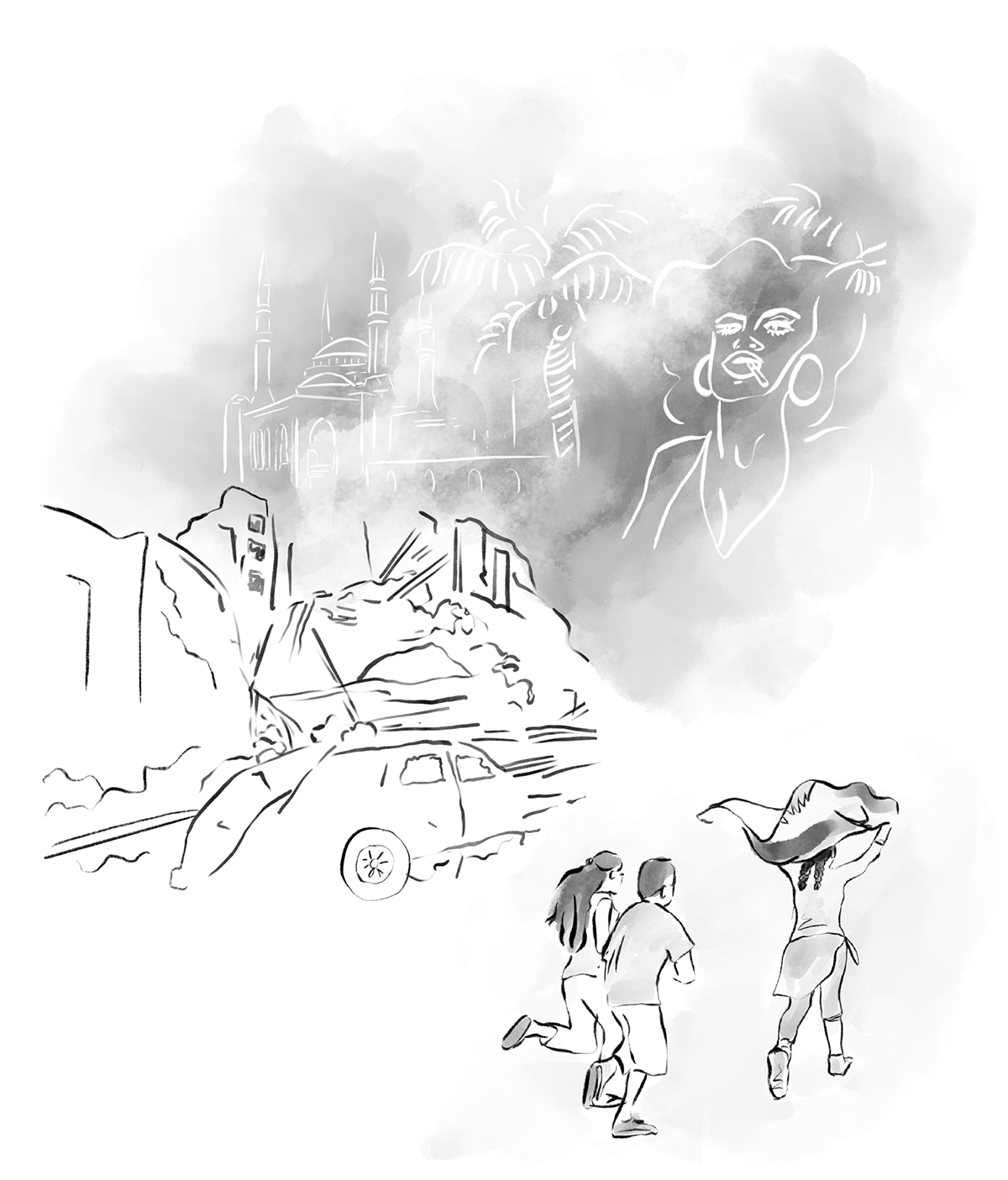

A month ago, I wished that by the time you read those words, I would still have a country, a nation to call mine, and to feel safe in. Lebanon’s end came much sooner than I expected.
Tonight, Beirut is on its knees. And so am I.
After the blast, I visited a few people in Karantina, one of Beirut’s most hard hit neighborhoods. A mother of three begged me to find someone to adopt her three children, get them out of the country, so they can have a future elsewhere in this world.
“I leave the house, and I don’t know if I’ll come back,” she says to me. “I wake up, I don’t if I’ll go to sleep that night. I have lunch, and I don’t know if I’ll have food to put on my kids’ plates tonight.”
Each time I leave home, I make sure I leave my windows open, a lesson all Beirutis learned the hard way; after all closed windows were pulverized during the blast. “I’ll leave them open in case,” I tell myself.
In case of what?
Normal is a luxury Lebanon doesn’t know. The civil war was only the beginning. Each time we think we’ve reached a routine, when we feel anchored, we’re reminded where we live.
There are some questions Lebanese must ask themselves in order to earn the right to call themselves Lebanese.
“Is my family okay? Are my friends still alive? Was this an explosion, firewords, or gunshots? Should I leave the country now? How much more can I take?”
While the rest of the world is waiting to go back to normal, watch a movie in theaters, sit in an indoor restaurant, and shake hands again, Lebanon remains paralyzed, chained to its uncertainty, stuck in limbo, and waiting for a normal that might never come.
TEXT BY TAMARA SAADE
ILLUSTRATIONS BY ELEONORE *LÉO HAMELIN
